The New York Chess Club tournament of 1868 commenced on January 6, at 2:00 P.M., with J.A. Ruthven against George H. Mackenzie, the latter giving odds of pawn and two moves. The encounter, between the club's librarian and the club's champion, was suprisingly won by the librarian. The second game in which the two men were pitted against each other was drawn, and on the following day - drawn games had to be replayed - Ruthven won again.(1)
The club competition had a exciting start, Captain Mackenzie losing two games in the fist round, but the outcome of the tournament was fully in accordance with expectations: Mackenzie became club champion for the third time (after having won in 1866 and 1867 as well). His victory was evident halfway through February, although the competition dragged on till the summer of 1868.
The New York Tribune announced the New York Chess Club tournament in the issue of January 8, 1868, and offered details.
| A handicap tournament of chess, open to the world, commenced on Monday, at the rooms of the New-York Chess Club, in the University Building, Washington-square. The game is open to all competitors who pay the entrance fee of $2. Visitors are invited to attend. The rules of the game are that each player shall play two games with every other contestant, and the person winning the greatest number of games will receive one-half of the stakes, the second one-third, and the third the remainder, one-sixth. |
The number of contestants was probably nineteen. Who they were, is a bit of a mystery. The American Chronicle of Sports and Pastimes printed the names of eighteen contestants twice.(2) However, the list of names did not fully correspond. Both reports mentioned, in addition to the two names offered above (Mackenzie and Ruthven), G.D. Ballantine, James P. Barnett, S.R. Dill, A. Findley, Jesse A. Graves, Adelmour W. King, B. Lissner, M. Lissner, W.R. Parker, M.M. Simpson, James Thompson, and J.H. Ward. Other names that were given in the first list are F. Bernier, C.F. Buhler, J.T. Irving, and R. Schultze, whereas the second report mentioned Dana, Frederick Perrin, Picare, and Charles H. Stanley.
The Albion of February 15, 1868, wrote that each player had to contest 36 games, which indicates that nineteen players had entered. Another hint in that direction is the number of games Mackenzie had finished when he was announced winner, which was 36. The number of classes, the classification of players, and the odds in this handicap tournament are unknown.
After his unsuccessful start Mackenzie quickly recovered the lost ground. A score up to January 14, 1868, published in The American Chronicle of Sports and Pastimes of January 23, 1868, showed him leading.
| Mackenzie | +20 | -4 |
| Ballentine | +12 | -12 |
| Parker | +11 | -16 |
| Simpson | +11 | -18 |
| Dill | +11 | -2 |
| Graves | +9 | -10 |
| Ward | +8 | -6 |
| Barnett | +8 | -4 |
| Picare | +7 | -11 |
| Perrin | +6 | -2 |
| Thompson | +5 | -5 |
| Dana | +4 | -4 |
| King | +4 | -10 |
| Ruthven | +3 | -3 |
| Findley | +2 | -9 |
| M. Lissner | +2 | -4 |
| Stanley | +2 | -10 |
| B. Lissner | +1 | -7 |
The Albion of February 15, 1868, announced that Mackenzie had won the tournament, being victorious in 30 games and losing 6. In the same source was stated that Dill (+20, -7) and Barnett (+14, -7) had the best chances of winning second and third prizes. The Turf, Field and Farm of March 7, 1868, added Thompson as a likely candidate, and The Albion (March 21, 1868) mentioned Perrin and Ward as well.
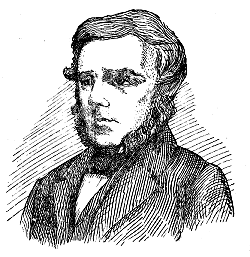
James Thompson.
His illness most likely slowed down the progress of the New York Chess Club tournament of 1868
The final report on the fray was found in The Spirit of the Times of August 1, 1868, in which editor Frederick Perrin copied an account in the Sunday Mercury that some effort had been made to bring the tournament to a conclusion. It seems that Thompson's illness had slowed down the competition.
| In accordance with our suggestion of last week in regard to this protracted tourney, some considerable effort has been made by the gentlemen interested in the unawarded prizes to bring the remaining play to a conclusion. During the past week, Mr. Perrin, having lost his fifteenth game, his position as a candidate for the second or third prize may be considered as lapsed in favor of Mr. James Thompson, whose re-appearance in chess-circles, after a prolonged sickness, we notice with unfeigned pleasure; and, judging from the dashing manner in which he carried off both of his tournament games from Mr. Dill, on Thursday evening, we should say that, in mental vigor, at least, he has suffered little from his late severe indisposition. |
It seems that either Thompson or Dill won second and third prizes. A final score of the tournament is missing.
The New York Tribune followed the early progress of the tournament closely. However, after three reports (the first appearing on January 8, and the final on January 10) the newspaper stopped reporting the New York Chess Club tournament news. The paper gave the (possible) reason in a answer to a correspondent in the issue of January 17, 1868:
| The "Chess Tournament" is a humbug. Regular reporters are refused the score of the games, and only those within the influence of the members of the club are allowed to copy them. |
Probably the most noteworthy incident in this tournament occurred in the game between Stanley and Mackenzie, played on January 8, 1868. It was described in several papers. The American Chronicle of Sports and Pastimes of January 16, 1868, for instance:
On Wednesday evening, the 8th inst., one of the most interesting games of the series was played, the contestants being Captain Mckenzie and Mr. C.H. Stanley. Neither had ever played in a match together before, and therefore they were unaware of each other's strategical skill.
The opening was an irregular one, neither apparently caring to initiate an attack, both manoeuvering to test each others skill before anything in the way of an attack was made. After the game had been pretty well openend, and Mr. Stanley had found that his adversary was on the alert for sly attacks, he planned a steady onward movement in materly style, and had succeeded in placing his adversary in a very dangerous position from which a rescue was almostimpossible, when by a very great oversight Mr. Stanley took hold of the wrong piece, and forgetting to say J'adoube - I replace - "or words to that effect," had to take the piece according to the rule of the game, the result being that lost his queen for a knight, and immediately afterwards resigned the game. It was a lucky escape for the Captain. The game was played over again from the point where the mistake was committed, and though there were several variations tried, the captain could not save his game, and but for Mr. Stanley's error would have undoubtedly been the defeated party, instead of the victor.
|
The position in question, in which Stanley touched the knight at f4 (the full game is given below):
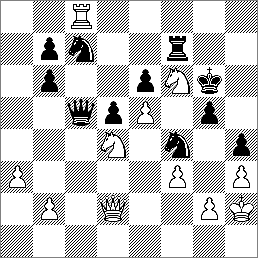
More chess columns, in the United States and Great Britain, reported in detail how Stanley lost this game, generally telling that he was "acting upon some hallucination for which he is at a loss to account" or something similar. Mackenzie's comment that accompanied this move was of a different composition: "Instead of this extraordinary blunder, had he simply taken K P with Kt, it is difficult to see how the second player could have saved the game. The mistake was all the more unfortunate as up to this point the game had been played with remarkable skill and ingenuity by Mr. Stanley."(3)
The results in this competition were (as far as is known, and besides the games given below): Ruthven won twice and drew one against Mackenzie, Graves won twice against Findley, Barnett drew one game against M. Lissner, Ballantine won and lost one game against Simpson, Ballentine won and lost one game aginst Parker, Ballentine won and lost one game against M. Lissner, Graves won and lost one game against Picare, Perrin won two games against Parker, Graves won one game against Parker, and Thompson won two games against Dill.(4)
Twenty-one games have been found.
| | Stanley,CH — Mackenzie,GH | |
| C26 | Vienna: Falkbeer | |
| 1868.01.08 | USA New York (New York Chess Club) |
|
Annotations by I.D.J. Sweet (The American Chronicle of Sports and Pastimes)
- 1.e4 e5 2.Nc3 Bc5 3.Bc4 Nf6 4.Nf3 d6 5.h3 Be6 6.Bb3 Nc6 7.d3 Ne7 8.Be3 Bb6 9.Qd2 c6 10.0-0 h6 11.Ne2 Qd7 12.Ng3 g5 13.Bxe6 fxe6 14.Bxb6 axb6 15.Nh2 Ng6 16.f3 Nf4 17.a3
- Preparatory to bringing queen's rook into play, with the view, if possible, to penetrate the enemy's centre - a strategic movement which, it will be seen, led to a severe struggle between the opposing forces.
- 17...h5 18.Rad1 c5 19.c3 Qe7 20.d4 exd4 21.cxd4 cxd4 22.Rfe1 h4 23.Nf5
- For this move Black does not seem to be exactly prepared. It will be observed that the capture of knight would involve the loss of queen. From this period, with moderately careful play, White's victory is secure.
- 23...Qd8 24.Nxd4 0-0 25.Ne2 Ne8 26.e5 d5 27.Ng4 Kg7 28.Nd4 Qe7 29.Rc1 Rd8 30.Rc3 Rf7 31.Rec1 Rd7 32.Rc8 Rc7 33.R1xc7 Nxc7 34.Nf6 Qc5 35.Kh2 Kg6 0-1
 - At this period of the game, acting upon some hallucination for which he is at a loss to account, Mr. Stanley touched his adversary's knight, which of course he was compelled to take with queen and in consequence he at once resigned the game. Nxe6, threatening the diagonal check with queen, was plainly his best course of play, and would have won easily.
The Albion, 1868.01.11
The American Chronicle of Sports and Pastimes, 1868.01.16
Wilkes' Spirit of the Times, 1868.01.18
Daily Evening Bulletin, 1868.01.31
The Era, 1868.02.16
The New York Clipper, 1868.02.22
Mackenzie, in The Albion, gives the extra moves 36.Qxf4 gxf4 before White resigned
| | Mackenzie,GH — Stanley,CH | |
| C70 | Spanish: Morphy (Graz) | |
| 1868.01.11 | USA New York (New York Chess Club) |
|
Annotations by I.D.J. Sweet (The American Chronicle of Sports and Pastimes)
- 1.e4 e5 2.Nf3 Nc6 3.Bb5 a6 4.Ba4 b5 5.Bb3 Bc5 6.0-0 Nge7 7.c3 d5 8.d4 exd4 9.cxd4 dxe4 10.Ng5 Qxd4 11.Bxf7+ Kf8 12.Qe2 h6 13.Be3 Qe5
- The various positions arising out of Black's seventh move have been both interesting and critical. Play as he may, we believe White must now lose a piece.
- 14.Ne6+ Bxe6 15.Bxe6 Bd6 16.f4 Qxe6 17.Nc3 Nf5 18.Rad1
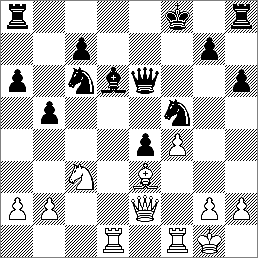 - 18...Ncd4
- An ill-considered move, which would have answered well enough had White taken with bishop instead of rook.
- 19.Rxd4 Nxd4 20.Bxd4 Re8 21.f5 Bxh2+
- Again a questionable course of play, as the taking with king is by no means compulsory.
- 22.Kh1 Qd6 23.f6 g6 24.f7 Re5 25.Bxe5 Qxe5 26.Qxe4 Qxe4 27.Nxe4 Be5
- 27...Bd6 would have probably led to a drawn game.
- 28.Nc5 Ke7 29.f8Q+ Rxf8 30.Rxf8 Bd6 31.Rg8 Kf7 32.Rc8 Bxc5 33.Rxc7+ Be7 34.Ra7 g5 (...) 0-1
New York Times, 1868.01.12
The American Chronicle of Sports and Pastimes, 1868.01.16
Turf, Field and Farm, 1868.01.18
Daily Evening Bulletin, 1868.01.31
| | Stanley,CH — Barnett,JP | |
| C50 | Italian: Pianissimo | |
| 1868 | USA New York (New York Chess Club) |
|
Annotations by George H. Mackenzie (Turf, Field and Farm)
- 1.e4 e5 2.Nf3 Nc6 3.Bc4 Bc5 4.d3 d6 5.Nc3
- This, we believe, is Mr. Stanley's favorite opening.
- 5...h6 6.Be3 Bb6 7.h3 Nf6 8.Qd2 Bxe3 9.fxe3 Na5 10.Bb3 Nxb3 11.axb3 c6 12.0-0 0-0 13.Rad1
- We are at a loss to understand the object of this move.
- 13...Qc7 14.Nh4 Kh7 15.Nf5 Qd8 16.Qf2
- At this stage of the game the first player has the advantage in position.
- 16...Ne8 17.Ne2 Qg5 18.Kh2 Be6 19.g4 g6 20.Nfg3
- 20.Rg1 would not have answered, as, after 20...gxf5 21.gxf5, Black would play 21...Qf6, thereby protecting the bishop.
- 20...Qh4 21.Kg2 Rd8 22.Ng1 Ng7 23.Nf3 Qe7 24.Nh2 f5
- The advance of this pawn is very well timed and gives Black the better position.
- 25.exf5 gxf5 26.Qe2 f4 27.exf4 exf4 28.Ne4 d5 29.Nf2 h5
- This also is very well played.
-
- 30.Nf3 Qf6 31.Rde1 Qg6 32.Qe5 Rf5 33.Qe2 Rf6 34.Ne5 Qg5 35.Nf3 Qg6 36.Ne5
- Evidently willing to consent to a drawn game.
- 36...Qh6 37.Qf3 Qg5
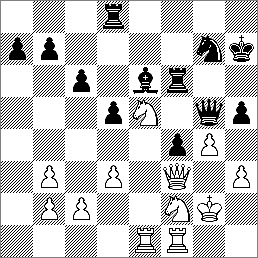 - 38.Rh1
- 38.Kh2, preventing the formidable move of 38...Nf5 would have been much better. The latter part of this game is exceedingly well played by Dr. Barnett.
- 38...Nf5 39.h4 Nxh4+ 40.Rxh4 Qxh4 41.Rh1 Qg3+ 42.Qxg3 fxg3 43.Kxg3 Rh6 44.g5 h4+ 45.Rxh4 Rxh4 46.Kxh4 Rf8 47.Nfg4 Bxg4 48.Nxg4 Rf1 49.Ne5 Rc1 50.g6+ Kg7 51.Kg5 Rxc2 52.Ng4 Rxb2 53.Ne3 Kf8 54.Kf6 Rf2+ 55.Nf5 a5 56.g7+ Kg8 57.Kg6 Rxf5 58.Kxf5 Kxg7 0-1
Turf, Field and Farm, 1868.02.22
Daily Evening Bulletin, 1868.03.06
| | Ballantine,GD — Perrin,F | |
| C65 | Spanish: Berlin | |
| 1868.01 | USA New York (New York Chess Club) |
|
Annotations by Frederick Perrin (Wilkes' Spirit of the Times)
- 1.e4 e5 2.Nf3 Nc6 3.Bb5 Nf6 4.d4
- Staunton, in the Hand-Book, pronounces 4.Qe2 as the best reply to Black's last move, and that 4.d4 only leads to an even game.
- 4...Nxd4 5.Nxd4 exd4 6.Qxd4 c6 7.e5
- Sacrificing a pawn with no compensation in position.
- 7...cxb5 8.exf6 Qxf6 9.Qxf6 gxf6 10.0-0 b4
- A necessary precaution to prevent Nc3.
- 11.Bf4 d5 12.Nd2 Be6 13.Nb3
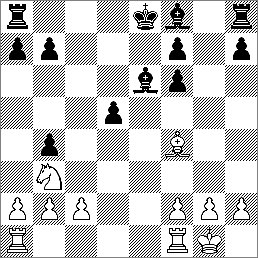 - 13...Rg8
- The object of this move will be seen as the game proceeds.
- 14.Rfe1 Rc8 15.Nd4 Kd7 16.Re2
- Worse than useless.
- 16...Bc5 17.Rd1
- Fatal!
- 17...Bg4 18.Rdd2
- 18.Red2, giving up the exchange, would have been better.
- 18...Bxd4 19.Rxd4 Bxe2 20.Rxd5+ Ke6 21.Rd2 Bf3 22.g3 Rgd8 1-0
- The coup de grace.
Wilkes' Spirit of the Times, 1868.01.18
Daily Evening Bulletin, 1868.01.31
| | Perrin,F — Ballantine,GD | |
| C54 | Giuoco Piano: Greco (Anderssen) | |
| 1868.01 | USA New York (New York Chess Club) |
|
Annotations by Frederick Perrin (Wilkes' Spirit of the Times)
- 1.e4 e5 2.Nf3 Nc6 3.d4 exd4 4.Bc4 Bc5 5.c3 Nf6 6.e5 d5 7.Bb5 Ne4 8.cxd4 Bb4+
- 8.Bb6 is preferable to the move made, which helps to develop White's game.
- 9.Bd2 Bxd2+ 10.Nbxd2 Bg4 11.Rc1 Bd7 12.Qb3 Ne7 13.Nxe4 Bxb5
- Losing a piece. 13...dxe4 was the correct play.
- 14.Qxb5+ c6 15.Nd6+ Kf8 16.Qd3 h6
- A very necessary precaution.
- 17.Nh4 g6 18.Qf3 Rh7 19.Qf6 Qd7 20.Rc3
- After the game, it was suggested by Capt. Mackenzie that White should have taken 20.Nxf7, for should Black's rook take knight, Black is mated in three moves.
- 20...Kg8 21.Rg3 Rg7 22.f4 Rf8 23.0-0 Kh7
- Threatening to win the game.
- 24.Nf3 Ng8 25.Qh4 f6 26.Rh3 Kh8 27.g4 Rh7 28.g5 fxg5 29.fxg5 h5 30.Qg3 Ne7 31.e6 Qxe6
- He has no better move.
- 32.Re1 Rxf3 33.Rxe6 Rxg3+ 34.Rxg3 Nf5 35.Nxf5 gxf5 36.Re8+ 1-0
Wilkes' Spirit of the Times, 1868.01.18
Daily Evening Bulletin, 1868.01.31
The New York Clipper, 1868.03.29
| | Mackenzie,GH — Parker,WR | |
| <Nb1> | Remove Knight at b1 | |
| 1868.01 | USA New York (New York Chess Club) |
|
- 1.e4 e5 2.Nf3 Nc6 3.Bc4 Bc5 4.b4 Bxb4 5.c3 Bc5 6.d4 exd4 7.0-0 d6 8.cxd4 Bb6 9.Bb2 Bg4 10.Bb5 Bd7 11.d5 Ne5 12.Bxd7+ Qxd7 13.Bxe5 dxe5 14.Nxe5 Qd6 15.Qa4+ c6 16.dxc6 Ke7 17.cxb7 Rb8 18.Nc6+ Kf8 19.Nxb8 Qxb8 20.Rad1 Qxb7 21.Rd7 Qc8 22.Rfd1 Ne7
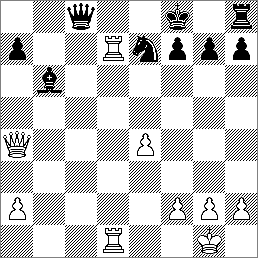 - 23.Qxa7 1-0
New York Times, 1868.01.19
The American Chronicle of Sports and Pastimes, 1868.01.23
Wilkes' Spirit of the Times, 1868.01.25
| | Mackenzie,GH — Thompson,J | |
| C15 | French: Winawer | |
| 1868.01 | USA New York (New York Chess Club) |
|
Annotations by George H. Mackenzie (The Albion)
- 1.e4 e6 2.d4 d5 3.Nc3
- We are inclined to think that this move is better than the usual one of 3.exd5, as the second player has great difficulties in bringing the queen's bishop into play.
- 3...Bb4 4.Bd3 dxe4 5.Bxe4 Nf6 6.Bg5 c6 7.Nf3 Qa5 8.Bd2 Nd5 9.0-0
- White gives up a pawn here for the purpose of more rapidly developing his game.
- 9...Nxc3 10.bxc3 Bxc3 11.Bxc3 Qxc3 12.Re1 Nd7 13.Re3 Qa5 14.Ne5 Nxe5
- Had he played 14...Nf6 White might have taken 15.Nxc6.
- 15.dxe5 Bd7
- Castling would have exposed him to a strong attack.
- 16.Qd6 Rc8 17.Ra3 Qb6 18.Rd1 Rd8
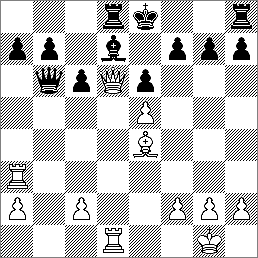 - 19.Rb3
- Badly played, as it enables Black to force an exchange of queens; the proper move was 19.Rad3.
- 19...Bc8
- Black does not fail to take immediate advantage of his opponent's faulty play.
- 20.Qxd8+ Qxd8 21.Rxd8+ Kxd8 22.f4 g6 23.Kf2 Ke7
- 23...Kc7 would perhaps have been preferable.
- 24.Ke3 Rd8 25.Bf3 f6 26.h4 fxe5 27.fxe5 Rf8 28.g4 Kd7 29.Rb4 Kc7 30.Rf4 Rd8 31.Rf7+ Rd7 32.Rf8 b5
- Black's bishop is so out of play that we believe his best plan would have been to draw the game by playing 32...Rd8.
- 33.h5
- 33.Bxc6 would probably have cost White the game.
- 33...gxh5 34.gxh5 Bb7 35.Re8 c5 36.Bxb7 Kxb7 37.Rxe6 b4 38.Rf6 Re7 39.Ke4 a5 40.Kd5 c4 41.Kd6 Rc7 42.e6 Rc6+ 43.Ke5 Kb6 44.e7 Rxf6 45.e8Q 1-0
The Albion, 1868.01.25
| | Mackenzie,GH — Perrin,F | |
| B44 | Sicilian: Barnes (Kasparov) | |
| 1868.01 | USA New York (New York Chess Club) |
|
Annotations by Howard Staunton (The Illustrated London News)
- 1.e4 c5 2.Nf3 e6 3.d4 cxd4 4.Nxd4 Nc6 5.Nb5 d6 6.Bf4 e5 7.Be3 Nf6 8.Bd3 Be7 9.0-0 0-0 10.h3 h6 11.Nd2 d5
- Up to this moment Mr. Perrin's game appeared a good deal constrained, and not quite secure from loss; but by the timely advance of this pawn he gives freedom to his forces; and soon acquires a position at least as strong and as safe as his opponent's.
- 12.exd5 Nxd5 13.Qe2 a6 14.Nc3 Nxc3 15.bxc3 f5 16.Bc4+ Kh8 17.f4 b5 18.Bb3 e4 19.Rad1 Qe8 20.c4 Rb8 21.cxb5 axb5 22.c4 bxc4 23.Nxc4 Ba6
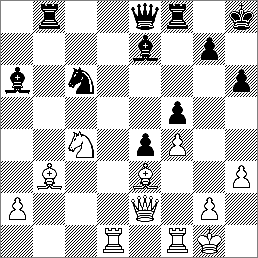 - By this time, it will be seen, Mr. Perrin has not only overcome all the difficulties of his opening, but has obtained a manifest advantage in position.
- 24.Qf2 Nb4
- Mr. Perrin thought afterwards that he should have played 24...Qg6, and thus have prevented the adverse queen taking possession of the g-file.
- 25.Qg3 Nd3 26.Bd4 Bf6 27.Bxf6 Rxf6 28.Rd2 Qc6 29.Rc2 Qc5+ 30.Kh2 Qd4 31.Rd1 Re8
- Black has certainly lost ground during the last three or four moves, and, but for his passed pawn, we should hesitate before taking his game in preference to Mr. Mackenzie's.
- 32.Ne5 Qa7
- "Had he taken the knight with rook," Mr. M. remarks, "White before retaking, would have moved rook to c7."
- 33.Ba4 Ree6 34.Bb3 Rd6 35.Rc3 Kh7 36.Rd2 Nxe5
- This exchange of his two rooks for the adverse queen was not a judicious stroke of barter for Black. In making it he evidently under-estimated the power of the enemy's advanced pawn.
- 37.fxe5 Rg6 38.exd6 Rxg3 39.Rxg3 Bd3
- Pawn to e3 would have been sufficiently answered by d7.
- 40.Be6 f4 41.Bf5+ Kg8 42.Rdxd3 exd3 43.Rxd3 Qa5
- It was suggested, when the game was over, that Mr. Perrin would have had some chance of making a drawn battle if he had played 43...Qb8 at this crisis. The move in question would have been better, no doubt, than that in the text; but against the best play it must have led to the same result.
- 44.d7 Qd8 45.Rc3 Qh4 46.d8Q+ Qxd8 47.Rc8 1-0
Turf, Field and Farm, 1868.01.25
Wilkes' Spirit of the Times, 1868.01.25
Daily Evening Bulletin, 1868.01.31
The Albion, 1868.02.01
The American Chronicle of Sports and Pastimes, date unknown (from a scrapbook)
The Illustrated London News, 1868.02.15
| | Perrin,F — Mackenzie,GH | |
| C54 | Giuoco Piano: Greco | |
| 1868.01 | USA New York (New York Chess Club) |
|
- 1.e4 e5 2.Nf3 Nc6 3.Bc4 Bc5 4.c3 Nf6 5.d4 exd4 6.e5 d5 7.Bb5 Ne4 8.cxd4 Bb6 9.Nc3 0-0 10.Bxc6 bxc6 11.0-0 f6 12.exf6 Qxf6 13.Nxe4 dxe4 14.Ne5 Ba6 15.Nd7 Qxd4 16.Qxd4 Bxd4 17.Nxf8 Rxf8 18.Be3 Bxe3 19.fxe3 Rxf1+ 20.Rxf1 Bxf1 21.Kxf1
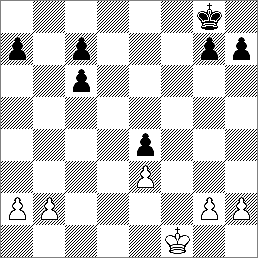 - 21...Kf7 22.Ke2 Ke6 23.Kd2 Kd5 24.Kc3 c5 25.b3 h5 26.h4 a6 27.a3 a5 28.g3 g6 29.Kc2 c4 30.b4 axb4 31.axb4 Kc6 32.Kb2 Kb5 33.Kc3 c5 34.bxc5 Kxc5 35.Kc2 Kb4 36.Kb2 c3+ 37.Kc1 Kb3 38.Kb1 c2+ 39.Kc1 Kc3 40.g4 hxg4 41.h5 g3 42.hxg6 g2 43.g7 g1Q# 0-1
Wilkes' Spirit of the Times, 1868.02.01
| | Graves,JA — Stanley,CH | |
| <Pf7> | Remove pawn at f7 | |
| 1868.01 | USA New York (New York Chess Club) |
|
Annotations by George H. Mackenzie (Turf, Field and Farm)
- 1.e4 e6
- 1...Nc6, we think, is the best defense the second player can adopt, both at the odds of pawn and move and pawn and two.
- 2.d4 d6 3.f4 c5 4.c3 g6 5.Nf3 Bg7 6.e5 dxe5 7.fxe5 cxd4 8.cxd4 Ne7 9.Bg5 0-0 10.Nc3 h6
- The advance of this pawn seems to us to weaken Black's position.
- 11.Bxe7 Qxe7 12.Bd3 Nc6
- Mr. Stanley, we believe, did wisely in abandoning the knight's pawn, as any attempt to save it would probably have entailed greater loss.
- 13.Bxg6 Bd7 14.0-0 Rad8 15.Qe2 a6 16.Rad1 Nb4 17.a3 Nd5 18.Bc2 Nf4 19.Qe4 Bc6
- If 19...Bh8, White replies with 20.Nh4.
- 20.Qh7+ Kf7 21.Bg6+ Nxg6 22.Nh4+
- 22.Ng5+, double check, with the intention of afterwards planting him at e4, would perhaps have been stronger.
- 22...Ke8 23.Qxg6+ Kd7 24.Rxf8 Rxf8 25.Qg4 h5 26.Qg3 Qf7 27.Nf3 Bh6 28.Qh3 Be3+ 29.Kh1
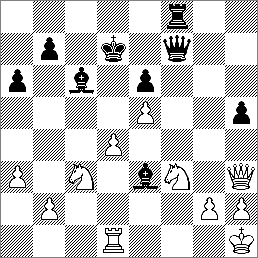 - 29...Qxf3
- Very prettily played.
- 30.Qxf3 Bxf3
- Unfortunately for Black he is obliged to take with bishop, as, if 30...Rxf3, White wins by 31.d5.
- 31.gxf3 Rxf3 32.Na4 Rf2 33.Rd3 Re2 34.Nc5+ Ke7 35.Nxb7 h4 36.h3 Re1+ 37.Kg2 Rg1+ 38.Kf3 Rg3+ 39.Ke4 Bc1 40.Rc3 Bxb2 41.Rc7+ Kf8 42.Nd8 Rxh3 43.Nxe6+ Ke8 44.d5 Rh1 45.d6 1-0
- The mate on e7 is forced in a move or two.
Turf, Field and Farm, 1868.02.01
Daily Evening Bulletin, 1868.02.07
| | Perrin,F — Thompson,J | |
| C44 | Scotch: Gambit (Haxo) | |
| 1868.02 | USA New York (New York Chess Club) |
|
Annotations by George H. Mackenzie (The Albion)
- 1.e4 e5 2.Nf3 Nc6 3.d4 exd4 4.Bc4 Bc5 5.c3 dxc3
- A grave mistake. 5...Nf6 should have been played, reducing the opening to a position in the Giuoco Piano.
- 6.Bxf7+ Kf8 7.Bxg8 Rxg8 8.0-0 d6 9.Nxc3 Bg4 10.Be3 Ne5 11.Nd5 c6 12.Nf4 g5 13.Nd3 Bxf3 14.gxf3
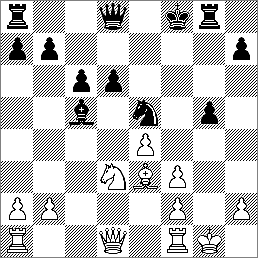 - 14...Bxe3
- 14...g4 appears to be a much more powerful move.
- 15.fxe3 Qb6 16.Nxe5 Qxe3+ 17.Kh1 dxe5 18.Qd6+ Kf7 19.Qd7+ Kg6
- 19...Kf8 might have prolonged the game, though nothing could have saved it.
- 20.Rad1 Raf8 21.Rd6+ 1-0
The Albion, 1868.02.08
Wilkes' Spirit of the Times, 1868.02.15
| | Barnett,JP — Mackenzie,GH | |
| <Pf7> | Remove pawn at f7 | |
| 1868.02 | USA New York (New York Chess Club) |
|
Annotations by George H. Mackenzie (Turf, Field and Farm)
- 1.e4 Nc6 2.d4 e5 3.d5 Nce7 4.Bg5 Nf6 5.Bxf6 gxf6 6.Qh5+ Ng6 7.Nf3 Ke7
- 7...Qe7 was formerly the usual move here but in that case the first player speedily obtains an almost decisive advantage by pushing 8.d6, as the following moves, which occurred in a game between Lewis and Deschappelles will show: 7...Qe7 8.d6 Qxd6 9.Nh4 Bg7 10.Nxg6 hxg6 11.Qxg6+ Kf8 12.Bc4 Qe7 13.0-0 with an excellent game. The singular looking move of 7...Ke7 is an invention of the celebrated Russian player, Petroff, who shows that if White then checks with pawn at d6, Black must obtain, at least, an equal game.
- 8.d6+ Kxd6 9.Nc3 c6 10.0-0-0+ Kc7 11.g3 Bc5 12.Rd2 d6 13.Bc4 Qe7 14.Na4
- White loses time with this knight.
- 14...b5 15.Nxc5 bxc4 16.Na4 Be6 17.Rhd1 d5 18.exd5 cxd5 19.Ne1 d4 20.f4 c3 21.Rd3 Bxa2
- 21...Bc4 would have been better.
- 22.Nxc3 Bc4
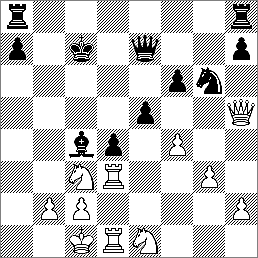 - Black declined giving up his queen for two rooks and the knight, as, after the exchanges his bishop might have been shut in by White's playing 25.b3.
- 23.Qf3 Rhd8 24.b3 Qa3+ 25.Kb1 Rab8 26.Na2 Bd5 27.Qh5 e4 28.Qxh7+
- If 28.Rxd4, Black wins by 28...Bxb3.
- 28...Rd7 29.Qxg6 exd3 30.Qxd3
- This loses the game off hand, but it is not easy to suggest a good move for White in this position.
- 30...Bxb3 31.cxb3 Rxb3+ 0-1
Turf, Field and Farm, 1868.02.08
Daily Evening Bulletin, 1868.02.21
The Era, 1868.03.08
The New York Clipper, 1868.04.25
| | Ruthven,JA — Stanley,CH | |
| <Pf7> | Remove pawn at f7 | |
| 1868 | USA New York (New York Chess Club) |
|
Annotations by George H. Mackenzie (Turf, Field and Farm)
- 1.e4 Nc6 2.d4 e5 3.d5 Nce7 4.Bg5 d6
- 4...Nf6 is commonly played here.
- 5.f4 h6 6.Bh4
- Lost time. He should have taken 6.Bxe7, and then pushed pawn to f5.
- 6...exf4 7.Be2 Qd7 8.Bxe7 Bxe7 9.Bh5+
- White does not derive much advantage from this check.
- 9...Kd8 10.Nf3
- A fatal error, which loses the game at once.
- 10...g6
- Mr. Stanley does not fail to profit by his opponent's weak play.
- 11.Bxg6 Qg4 12.Bf7 Qxg2 13.Rg1 Bh4+ 14.Nxh4 Qxg1+ 15.Kd2
- If 15.Ke2, mate, or the loss of the queen, follows in a move or two.
- 15...Qe3# 0-1
Turf, Field and Farm, 1868.02.08
Daily Evening Bulletin, 1868.02.21
| | Perrin,F — Stanley,CH | |
| C44 | Scotch: Gambit (Haxo) | |
| 1868.02 | USA New York (New York Chess Club) |
|
Annotations by Janós J. Löwenthal (The Era)
- 1.e4 e5 2.Nf3 Nc6 3.d4 exd4 4.Bc4 Bc5 5.c3 d3
- An old stager, like Mr. Stanley, we should have expected to play 5...Nf6, instead of this obsolete and inutile coup.
- 6.Ng5 Nh6 7.Nxf7
- A méprise which brings him into trouble almost before the battle has begun. He ought to have taken 7.Bxf7+.
- 7...Qf6
- Black does not fail to appreciate the advantage his opponent's slip has given him, and he takes care to avail himself of it to the utmost.
- 8.Be3
- The only way to avoid the loss of a piece.
- 8...Bxe3 9.fxe3 Qh4+
- Of course, if he had taken 9...Nxf7, White would have recovered his loss by playing 10.Rf1, etc.
- 10.g3 Qxe4 11.Nxh8 Qxh1+ 12.Kd2 Qxh2+ 13.Kc1 Qc2+
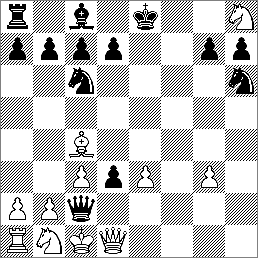 - After this move, as Mr. Perrin observes in Wilkes' Spirit of the Times, the game was virtually won for Black.
- 14.Qxc2 dxc2 15.Kxc2 Ne5 16.Bb3 d6 17.Nd2 Nf5 18.Nf1 Ke7 19.g4 Nh6 20.g5 Nhg4 21.Ng3 Nxe3+ 22.Kd2 N3c4+ 23.Bxc4 Nxc4+ 24.Kc2 Ne5 25.g6 hxg6 26.Rh1
- White fights this painfully uphill battle with skill and good courage; resolved to deserve, if he don't gain success.
- 26...Bf5+ 27.Kb3 Kf6 28.Ne2 c5 29.Nf4 c4+ 30.Ka3 Rc8 31.Nd5+ Ke6 32.Nf4+ Ke7 33.Nd5+ Kd7 34.Rh7 Ke6 35.Nf4+ Kf6 36.Nd5+ Kg5 37.b4 cxb3 38.axb3 Rc5 39.c4 b5 40.Rxg7 bxc4 41.Nc3 cxb3 42.Kxb3 Be6+ 43.Kc2 Rc8 44.Rh7
- He makes a gallant struggle, truly!
- 44...d5 45.Kd2 Nf3+ 46.Ke2 Rxc3 47.Rxa7 d4 48.Nf7+ Kf4 49.Nd6 (# in 3) 0-1
- And now, Mr. Stanley having his enemy in the toils, checkmated him dexterously in three more moves.
The Albion, 1868.02.15
Wilkes' Spirit of the Times, 1868.02.29
The Era, 1868.03.22
| | Stanley,CH — Perrin,F | |
| C50 | Italian: Pianissimo | |
| 1868 | USA New York (New York Chess Club) |
|
Annotations by George H. Mackenzie (The Albion)
- 1.e4 e5 2.Nf3 Nc6 3.Bc4 Bc5 4.d3 d6 5.h3 h6 6.Be3 Bb6 7.Nc3 Nf6 8.Qd2 Be6 9.Bb3 Qd7
- The opening is played with great caution by both parties, and what is somewhat unusual, at the 13th move the situation of the pieces on both sides, is exactly alike.
- 10.Rd1 Rd8 11.0-0 0-0 12.Ne2 Ne7 13.Ng3 Ng6
- 13...Kh7 was the proper move as White could not then advantageously sacrifice his bishop.
- 14.Bxh6
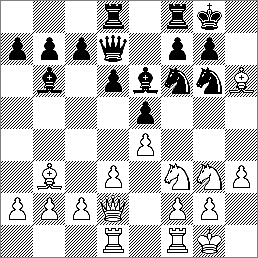 - This appears to be perfectly sound.
- 14...gxh6 15.Qxh6 Nh7
- Immediately fatal, we believe, however, that in any case White must have won his piece back, and remained with two pawns ahead.
- 16.Nh5 f6 17.Bxe6+ 1-0
The Albion, 1868.02.22
Daily Evening Bulletin, 1868.03.06
| | Perrin,F — Barnett,JP | |
| C44 | Scotch: Gambit (Haxo) | |
| 1868.03 | USA New York (New York Chess Club) |
|
Annotations by Frederick Perrin (Wilkes' Spirit of the Times)
- 1.e4 e5 2.Nf3 Nc6 3.d4 exd4 4.Bc4 Bc5 5.c3 d3 6.b4 Bb6 7.b5 Na5 8.Bxd3 d6 9.e5 dxe5 10.Nxe5 Be6 11.0-0 Nf6 12.Ba3 Qd5 13.Qe2 Bc5 14.Rd1 Bxa3 15.Nxa3 Qc5 16.Nac4 Nxc4 17.Bxc4 0-0 18.Bxe6 fxe6
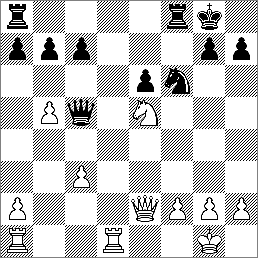 - 19.c4
- Capt. Mackenzie condemns this move, and thinks that 19.Nd7 would have given White the better game. Suppose: 19.Nd7 Nxd7 20.Qxe6+ Kh8 21.Qxd7 Qxf2+; we prefer Black's game. If in reply to 19...Nxd7, White plays 20.Rxd7, Black answers with 20...Rae8.
- 19...Rad8 20.h3 Rd6 21.Rac1 Rfd8 22.Rd3 Rxd3 23.Nxd3 Qf5 24.Ne5 Ne4 25.Nf3 Nc5 26.Rd1 Rxd1+ 27.Qxd1 Qd3
- Well played.
- 28.Qxd3 Nxd3 29.Kf1 h6
- To prevent White from playing Ng5.
- 30.g3 Kf7 31.Ke2
- At first sight this move appears to lose a pawn.
- 31...Nc1+ 32.Kd2 Nxa2 33.Ne5+ Ke7 34.Nd3
- This move imprisons the Black knight.
- 34...a5 35.bxa6 bxa6 36.Kc2 a5 37.Kb3 Nb4 38.Nxb4 axb4 39.Kxb4 Kd6 40.f4 h5 41.c5+ Kd5 42.Kb5 c6+ 43.Kb6 g5 44.fxg5 e5 45.g6 Ke6 46.Kxc6 e4 47.Kb6 e3 48.c6 e2 49.c7 e1Q 50.c8Q+ Kf6 51.Qc6+ Kg7 52.Qd6 Qf1 53.h4 Qb1+ 54.Kc5 Qxg6 55.Qxg6+ Kxg6 56.Kd4 Kf5 57.Ke3 Kg4 58.Kf2 Kf5 59.Kf3 Kg6 60.Ke4 Kf6 61.Kf4 Kg6 62.Ke5 1-0
The Albion, 1868.03.07
Wilkes' Spirit of the Times, 1868.03.07
Mackenzie, in The Albion, gives the additional moves 62...Kh7 63 Kf5
| | Barnett,JP — Perrin,F | |
| B32 | Sicilian | |
| 1868.03 | USA New York (New York Chess Club) |
|
Annotations by Frederick Perrin (Wilkes' Spirit of the Times)
- 1.e4 c5 2.d4 cxd4 3.Nf3 Nc6 4.Nxd4 Nxd4 5.Qxd4 e6 6.Nc3 Ne7 7.Bg5 Nc6 8.Qd2 f6 9.Be3 Bb4 10.Bd3 d5 11.Bb5 Qa5 12.Bxc6+ bxc6 13.exd5 cxd5 14.0-0 0-0 15.a3 Bxc3 16.bxc3 Ba6 17.Rfb1 Bc4 18.h3 Rfb8 19.Rb4 Qc7 20.Rab1 a5
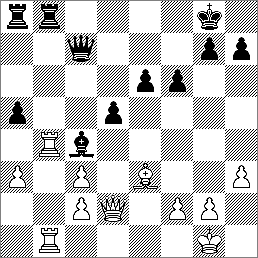 - This move loses a pawn, but, as the sequel shows, it was no real loss for Black.
- 21.Bb6 Qd6 22.Bxa5 Rxb4 23.Bxb4
- Better than taking with pawn, as Black by 23...Rb8 would have imprisoned his bishop for many moves.
- 23...Qc6 24.f4 e5
- Checking would have been useless, for White in that case would have interposed queen.
- 25.fxe5 fxe5 26.Re1 Re8 27.Re3 Qb6 28.Kh2 Re6 29.Qf2 Rf6 30.Qe1 e4 31.Qg3 h6 32.Be7 Rf1 33.Bb4 Qa7 34.Bd6 Qf7 35.Bc5 Ra1 36.Bd6 Qf1 37.Qf4 Qh1+
- "White should have checked at KR7."
- It seems likely that Perrin means: Black should have checked with Qxf4+ {Editor}
- 38.Kg3 Rf1 39.Qg4 Qg1 40.Bc5 Rf2 (...) 0-1
Wilkes' Spirit of the Times, 1868.03.14
| | Graves,JA — Perrin,F | |
| B21 | Sicilian: Macdonnell | |
| 1868 | USA New York (New York Chess Club) |
|
Annotations by Janós J. Löwenthal (The Era)
- 1.e4 c5 2.f4 e6 3.Nf3 d5 4.Bb5+ Bd7 5.Bxd7+ Qxd7 6.e5 Be7 7.0-0 Nc6 8.d4
- A fault. He should rather have played d3 or c3.
- 8...cxd4 9.Nxd4 Bc5 10.c3 Nge7 11.Kh1 Bxd4 12.cxd4 Nf5
- Already Mr. Graves has got the worst of the fight. The loss of the queen's pawn must needs prove a heavy blow.
- 13.b3 Nfxd4 14.Qg4 f6
- We should, certainly, have gone in to win the queen's rook, by playing 14...Nc2. Of what avail would the capture of the g-pawn have been to Black? Mr. Perrin could then have castled with the queen's rook in perfect security.
- 15.Qd1 Nf5 16.Ba3
- He purposely sacrificed the exchange, we presume, to prevent his opponent's castling with his king's rook. A high price for the prevention!
- 16...Ne3 17.Qe2 Nxf1 18.Qxf1 Nd4 19.Qd1 Nb5 20.Qg4
- As we were; and nothing gained meanwhile.
- 20...b6 21.Bb4 0-0-0 22.exf6 gxf6 23.Nc3 Nc7 24.Rc1 Kb7 25.Ne2 Nb5 26.a4 Rhg8 27.Qf3 Nd6 28.Bc3 Ne4 29.Bd4 Rc8 30.Ra1 Rc2 31.a5 Qf7 32.axb6 axb6 33.Qe3 Qg6
- 33...Qh5 would have been a great deal stronger play.
- 34.g3 Qh5 35.g4 Qxg4 36.Rg1 Qxe2 0-1
Wilkes' Spirit of the Times, 1868.03.21
The Era, 1868.04.26
| | Barnett,JP — Stanley,CH | |
| C50 | Italian | |
| 1868 | USA New York (New York Chess Club) |
|
Annotations by George H. Mackenzie (The Albion)
- 1.e4 e5 2.Nf3 Nc6 3.Bc4 Bc5 4.0-0 d6 5.c3 Bb6 6.d4 Nf6 7.Bg5
- 7.dxe5 appears to us more advantageous for the first player.
- 7...0-0 8.h3 h6 9.Bxf6 Qxf6 10.dxe5 dxe5 11.Nh2 Be6 12.Bxe6 Qxe6 13.Nd2 Rad8 14.Qe2 Ne7 15.Nc4 Ng6 16.Nxb6 axb6 17.b3 Nf4
- The commencement of a vigorous attack.
- 18.Qg4 f5 19.exf5 Rxf5 20.Rad1 Rdf8 21.Rd2 R8f6 22.Qd1 Rg6 23.Ng4
- We doubt if he has anything much better.
- 23...h5 24.Rd8+ Kh7 25.Ra8 hxg4 26.Qd8 Rh6 27.h4
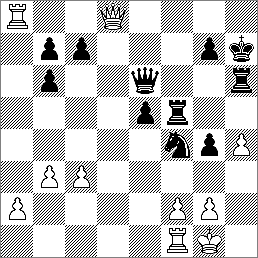 - 27...Ne2+
- A hasty move. By playing 27...Rf8, as Mr. S. afterwards remarked, he must have won a clear rook, or given mate in two moves.
- 28.Kh2 Qe8 29.g3 Qxd8 30.Rxd8 Nxc3 (...) 0-1
The Albion, 1868.05.30
| | Perrin,F — Ruthven,JA | |
| C44 | Ponziani: Jaenisch | |
| 1868 | USA New York (New York Chess Club) |
|
Annotations by Frederick Perrin (Wilkes' Spirit of the Times)
- 1.e4 e5 2.Nf3 Nc6 3.c3 Nf6 4.d4 Nxe4 5.Bd3
- 5.dxe5 is the usual move.
- 5...d5 6.dxe5 Bg4 7.Bb5 Bc5 8.0-0 0-0 9.Bxc6 bxc6 10.Be3 Bb6 11.Qd3
- A useless move.
- 11...Bf5 12.Qe2 Bg4 13.a4 f6 14.Bf4 fxe5 15.Bxe5 Bxf3 16.gxf3 Qg5+
- Already Black has obtained a manifest advantage of position.
- 17.Kh1 Nxf2+
- Well played.
- 18.Rxf2 Bxf2 19.Qxf2 Qxe5 20.Nd2 Qf4 21.Rg1 Rf6 22.Qe2 Qxa4
- For the sake of a pawn valuable time is lost.
- 23.Qe7 Rg6 24.Re1 Qf4 25.Qd7 Rf8
- It is obvious that if Black had taken the knight he would have been mated in two moves.
- 26.Re2 Rh6 27.h3
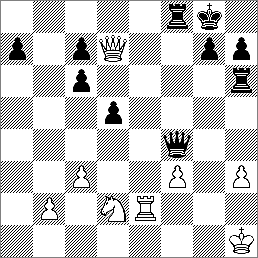 - White's game was so desperate that he adopted that line of play, which ultimately secured him a drawn game.
- 27...Qg3 28.Rg2 Rxh3+ 29.Kg1 Qe1+ 30.Nf1 Rh1+
- Apparently his best move.
- 31.Kxh1 Qxf1+ 32.Kh2 g6 33.Qe6+ Kg7 34.Qe5+ Kh6 35.Qg5+ Kg7 36.Qe7+ Rf7 37.Qe5+ Kf8 38.Re2
- Threatening mate.
- 38...Kg8 39.Qe8+ Rf8 40.Qe6+ Kg7 41.Qe5+ Kh6 42.Qe3+ Kh5 43.Kg3 g5 44.Rh2+ Kg6 45.Qe6+ Rf6 46.Rh6+
- Best; for had he checked 46.Qg8+ and taken 47.Qh7+, he would have lost the game.
- 46...Kxh6 47.Qxf6+ ½-½
- And draws by perpetual check.
Wilkes' Spirit of the Times, 1868.07.25
| | Perrin,F — Ward,JH | |
| C44 | Scotch: Gambit (Haxo) | |
| 1868.05 | USA New York (New York Chess Club) |
|
Annotations by George H. Mackenzie (Turf, Field and Farm)
- 1.e4 e5 2.Nf3 Nc6 3.d4 exd4 4.Bc4 Bc5 5.c3 d6
- 5...Nf6 is considered stronger.
- 6.b4 Bb6 7.cxd4 Nf6 8.b5 Ne7 9.Qd3 h6 10.0-0 0-0 11.Nc3 d5 12.exd5 Nfxd5 13.Nxd5 Nxd5 14.Ba3 Re8 15.Rae1 Be6 16.Re5 Nf4
- A knight posted on this square is usually very troublesome to the adversary.
- 17.Qc3 Bxc4 18.Qxc4 Qf6 19.Rfe1 Rxe5 20.Nxe5 Re8 21.Bb2 Ng6 22.Nf3 Rxe1+ 23.Nxe1 Nf4
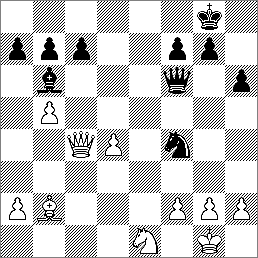 - Threatening to take the queen's pawn with bishop.
- 24.Kf1
- If 24.Nf3, Black replies with 24...Qg6.
- 24...Ne6 25.Nf3 Qf5 26.a4 Qb1+ 27.Bc1 Bxd4 28.g3
- An unfortunate mistake, which loses a piece. We should have taken 28.Nxd4 and then 29.Qxd4, when, although a pawn ahead, it would have been exceedingly difficult for Black to win.
- 28...Bb2 (...) 0-1
Turf, Field and Farm, 1868.05.16
- (1) The American Chronicle of Sports and Pastimes, January 9, 1868; New York Tribune, January 9, 1868; The Spirit of the Times, January 11, 1868.
- (2) The American Chronicle of Sports and Pastimes, January 9 and 23, 1868.
- (3) The Albion, January 11, 1868.
- (4) New York Tribune, January 8 and 9, 1868; The American Chronicle of Sports and Pastimes, January 9, 1868; The Spirit of the Times, January 11 and August 1, 1868.
© 2011 Joost van Winsen. All rights Reserved.
|


